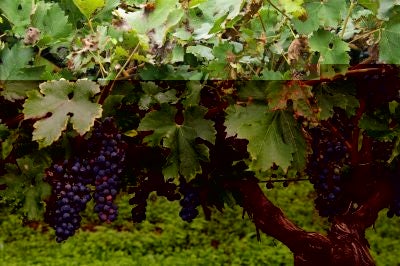Climate change has silver lining for England's vineyards

Your support helps us to tell the story
From reproductive rights to climate change to Big Tech, The Independent is on the ground when the story is developing. Whether it's investigating the financials of Elon Musk's pro-Trump PAC or producing our latest documentary, 'The A Word', which shines a light on the American women fighting for reproductive rights, we know how important it is to parse out the facts from the messaging.
At such a critical moment in US history, we need reporters on the ground. Your donation allows us to keep sending journalists to speak to both sides of the story.
The Independent is trusted by Americans across the entire political spectrum. And unlike many other quality news outlets, we choose not to lock Americans out of our reporting and analysis with paywalls. We believe quality journalism should be available to everyone, paid for by those who can afford it.
Your support makes all the difference.As world leaders grapple with how to tackle climate change in Copenhagen next week, England's winegrowers are embarrassed to admit that global warming is suiting them rather well.
This year's crop has been one of the best yet, with a record three million bottles produced - twice the average production of the past five years - and producers think the changing climate is the cause.
"We are benefiting from a global disaster. It seems horrible, inappropriate, but that's how it is," admitted Christopher Foss, the head of wine studies at Plumpton College in Sussex, southern England.
"In less than 10 years, southern England will enjoy a climate similar to the Loire Valley, and in 20 years, a climate similar to Bordelais," the region around Bordeaux in southwest France, he added.
Winegrowers have in recent years begun planting in southern English regions once home to Roman vineyards, and are seeing their efforts bear fruit.
After a bumper haul this year, English producers have high hopes for the future of their white and especially sparkling wine, which they compare to champagne.
While the name "champagne" is strictly limited to wines grown in the region of that name in northeastern France, English winegrowers say their bubbly is not dissimilar, noting the same chalk soil composition and relatively cool climate both sides of the Channel.
Researchers in Cambridge have lent weight to the idea of a link between the French and English winegrowing regions, suggesting the waters that separate them now were once - 9,000 years ago - simply a lake.
Global warming could well blur their future too, with green campaigners warning that rising temperatures look set to give England a climate more like that of southern France within the next 100 years.
A recent Greenpeace report warned that a rise of between four and six degrees Celsius - which they think likely if greenhouse gas emissions continue unchecked - would see the optimum latitude for growing wine shift 1,000 kilometres (620 miles) north.
This would spell trouble for viticultural regions such as Bourgogne south of Paris and the Cotes du Rhone even further south, but good news for winegrowers in Sussex, Kent, Dorset and Gloucestershire, in southern England.
French growers are already having problems growing pinot noir grapes, and certain wines have become too sweet and with a stronger taste of alcohol, according to Greenpeace.
However, any benefit to England is likely to be short lived, if climate scientists' worst-case prediction of a six to eight degree increase in global temperatures by the end of the century becomes a reality.
Richard Selley, emeritus professor of geology and a senior research fellow at Imperial College, London, has warned that within 75 years certain regions in England could actually be too hot to grow wine.
For the time being, however, English wines are flourishing, with producers here beginning to win international prizes for their sparkling wines using pinot noir, pinot meunier and chardonnay grapes, according to Foss.
"The English wines are a little bit like English apples... with hedgerow flavours... just like a beautiful autumn afternoon," said wine critic Tim Atkin.
Despite a bottle of English "fizz" costing about the same as a bottle of champagne, it fits well into a current trend for buying local produce - even if it cannot come close to slaking Britain's thirst for the drink.
Britain is the largest importer of champagne in the world, buying 30 million bottles a year, and just 0.3 percent of the wine drunk here is English.
Join our commenting forum
Join thought-provoking conversations, follow other Independent readers and see their replies
Comments